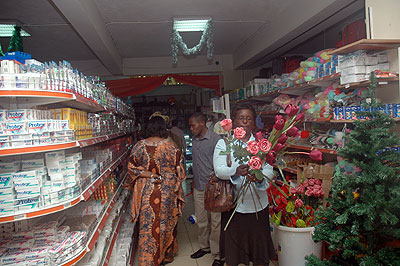RWANDAN traders, under Private Sector Federation (PSF), have decried delays in starting up business, the other East African Community member, citing recurrent challenges.


RWANDAN traders, under Private Sector Federation (PSF), have decried delays in starting up business, the other East African Community member, citing recurrent challenges.The traders say that through the Common Market protocol was signed to ease doing business, its poor implementation has continued to hinder their businesses urging that there is need for solid advocacy to ensure that integration benefits are mutually shared.The business community expressed their concerns to The New Times on the sidelines of a one day meeting aimed at discussing how the community can benefit from the EAC integration process as well as challenges and opportunities in the trading bloc.The meeting attracted PSF representatives from all districts in the country and they are being trained by officials from the Ministry of East African Community affairs. "When our counter parts come to Rwanda it is easy for them to start up business. They are easily integrated but markets like Uganda and Kenya are difficult for us to penetrate into,” said Severin Byusa, a businessman, also the PSF president in Musanze district.He observed that the Common Market protocol still has hurdles like non-tariff barriers which he said that unless they are removed, the integration will still be a challenge."The market is not yet open as it is ought to be; there are some countries where you will need to open up a business and when they realise you are a foreigner, the charges will be hiked,” he said.While it takes six hours to register a company in Rwanda, in other EAC countries it takes between one week and a month, which traders think should be changed.Margaret Abaluje, a trader who is vice chairman PSF in Gasabo district, said that Rwandan products do not trade fairly on the regional market due to high production costs in the country.We produce little that is also expensive and it becomes difficult to compete on the regional market,” she said in an interview.She added that problems like language barriers and inadequate information concerning the benefit of integration process among the local traders also remained a challenge.She said that more sensitisation campaigns among local traders would help in proper understanding on the integration and the benefit as a country.Ambassador George William Kayonga, the Permanent Secretary in the Ministry of EAC, urged the business community to be more aggressive in exploiting the regional market.However, despite the existing trade barriers, Rwanda increased its exports to the East African Community partner states, while attracting investors from the region.Official figures from the National Bank of Rwanda indicate that the country’s trade with other EAC partner states has been increasing annually. From January to August this year, the country’s exports within EAC increased to $75.7 million up from $50.7 million, during the same period last year.Still, as a result of Rwanda’s membership in the community, more regional companies have invested in Kigali, creating employment opportunities as well as competition. Some of the regional companies that have set up shop locally include Kenya’s Nakumatt Supermarket, Equity Bank, Nation Media Group, Mt Kenya University, Tourism Promotion Services, and Tanzania’s Oil Com and Bakheresa Grain Milling Ltd.Others are Kenya Commercial Bank, Fina Bank, East African Growers Limited, and I&M Bank, which recently acquired 80 per cent shares of Commercial Bank of Rwanda (BCR), among others.


